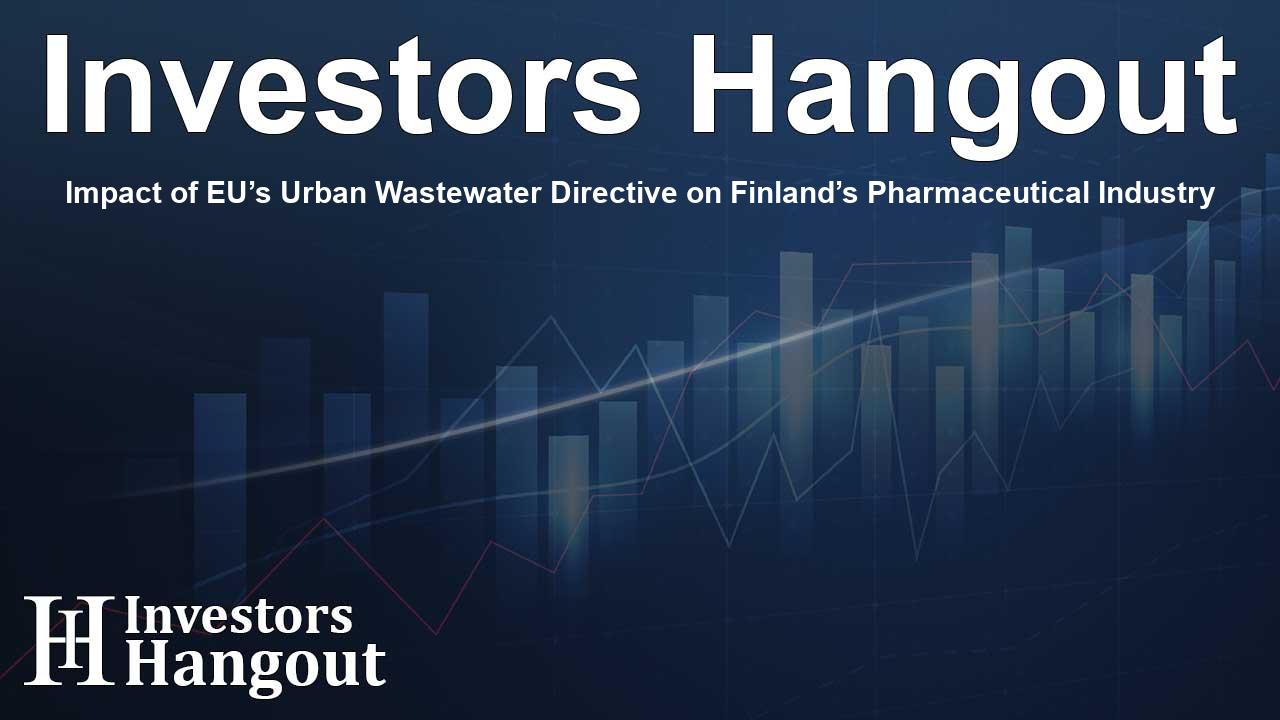Impact of EU’s Urban Wastewater Directive on Finland’s Pharmaceutical Industry

Understanding the EU’s Urban Wastewater Treatment Directive
The newly enforced Urban Wastewater Treatment Directive by the EU, effective from January 1, 2025, carries significant implications for various industries, particularly pharmaceuticals. This directive requires manufacturers in the pharmaceutical, cosmetics, and hygiene sectors to take charge of the costs associated with removing micro-pollutants from wastewater. With the estimated costs expected to soar to nearly EUR 1 billion in Finland alone, stakeholders are understandably anxious about the future.
The Financial Implications of Compliance
A recent study conducted by VTT Technical Research Centre highlights the financial burden anticipated under this directive. The estimated costs for investment and maintenance can reach between EUR 280 million and EUR 816 million in Finland. It’s particularly concerning for the country's seven largest wastewater treatment plants, where costs could vary between EUR 237 million and EUR 353 million. When factoring in the extensive network of 71 medium-sized treatment plants, the total investment and construction expenses can range between EUR 46 million and EUR 463 million, significantly overshadowing previous estimates from the European Commission.
Assessing the Threat to Medicine Availability
This sharp increase in operational costs poses an alarming risk to drug availability in Finland. The pharmaceutical industry is well aware that the projected expenses might discourage manufacturers from sustaining their current range of medicines. The situation is critical, as Finland represents a small market, where the increased costs could become a stumbling block for businesses. The traces of pharmaceuticals in wastewater primarily result from everyday medication use rather than from manufacturing, complicating the narrative further.
Stakeholder Concerns and Proposed Solutions
Given the pressing nature of this matter, the pharmaceutical sector has called for a comprehensive assessment of the directive's impact. It is crucial for policymakers to ensure that the directive’s implementation does not detrimentally affect society or patient access to necessary medications. The directive allows for a 20% societal expense share to be contributed alongside producers. However, due to rigorous price controls in place, pharmaceutical companies have limited ability to absorb these escalating costs, which makes this financial mechanism pivotal in maintaining medicine availability.
The Role of the Pharmaceutical Industry
As critical providers of medications, pharmaceutical companies are expressing deep concerns regarding the potential depletion of drug options available to patients. The industry's ability to profitably market and produce pharmaceuticals hinges on regulatory measures that protect their operational viability. Without consideration for the competitive landscape and operational resilience of the pharmaceutical sector, many fear that availability could dwindle, leaving patients vulnerable.
Environmental Responsibility vs. Economic Viability
While the directive's goal to protect the environment from inadequately treated wastewater is commendable, it operates under a delicate balance. The pharmaceutical industry has long demonstrated its commitment to minimizing environmental impact and continues to uphold this responsibility. However, the current regulations may inadvertently threaten the industry’s ability to function effectively, particularly in smaller markets like Finland.
The Importance of Strategic Regulation
To fortify the healthcare landscape, EU legislation must support the competitiveness and operational capacity of pharmaceutical companies. This approach is paramount to ensuring that essential medications remain accessible while simultaneously addressing environmental challenges. The limited allocation of treatment costs to only two industry sectors suggests a regulatory framework that lacks incentive for other industries to mitigate micro-pollutant output.
Moving Forward: Balancing Act between Compliance and Care
Implementing a balanced strategy that encompasses environmental stewardship while preserving pharmaceutical availability is crucial. The need for a sustainable, responsible approach to new regulations is evident. As the industry grapples with the ramifications of the Urban Wastewater Treatment Directive, collaboration among stakeholders will be vital. Securing adequate funding and support can potentially alleviate the financial burdens on the pharmaceutical industry in Finland.
Frequently Asked Questions
What is the EU’s Urban Wastewater Treatment Directive?
This directive mandates that manufacturers, including those in the pharmaceutical industry, manage the costs of removing micro-pollutants from wastewater.
How much will the directive potentially cost Finland?
Estimates suggest that the directive could impose nearly EUR 1 billion in additional costs in Finland alone.
What impact will this have on medicine availability?
The increased costs may lead to decreased medicine availability as companies may find it unprofitable to continue producing certain medications.
What is the role of stakeholders in this situation?
Stakeholders, particularly in the pharmaceutical industry, emphasize the need for a meticulous impact assessment to inform policy changes.
Why is the pharmaceutical industry vital for Finland?
The industry is crucial for maintaining the health of the population, providing essential medicines that treat various conditions.
About The Author
Contact Dylan Bailey privately here. Or send an email with ATTN: Dylan Bailey as the subject to contact@investorshangout.com.
About Investors Hangout
Investors Hangout is a leading online stock forum for financial discussion and learning, offering a wide range of free tools and resources. It draws in traders of all levels, who exchange market knowledge, investigate trading tactics, and keep an eye on industry developments in real time. Featuring financial articles, stock message boards, quotes, charts, company profiles, and live news updates. Through cooperative learning and a wealth of informational resources, it helps users from novices creating their first portfolios to experts honing their techniques. Join Investors Hangout today: https://investorshangout.com/
The content of this article is based on factual, publicly available information and does not represent legal, financial, or investment advice. Investors Hangout does not offer financial advice, and the author is not a licensed financial advisor. Consult a qualified advisor before making any financial or investment decisions based on this article. This article should not be considered advice to purchase, sell, or hold any securities or other investments. If any of the material provided here is inaccurate, please contact us for corrections.
